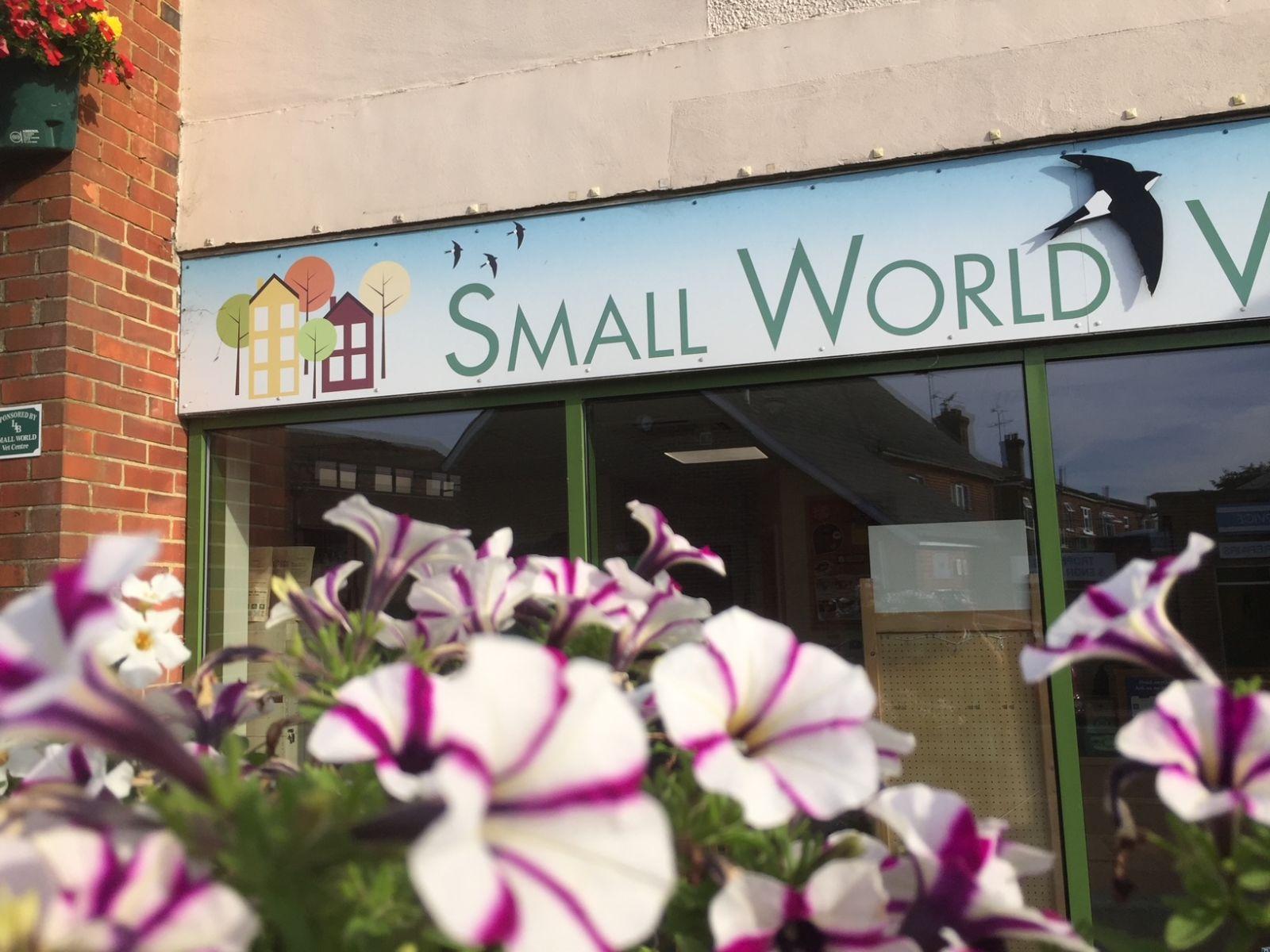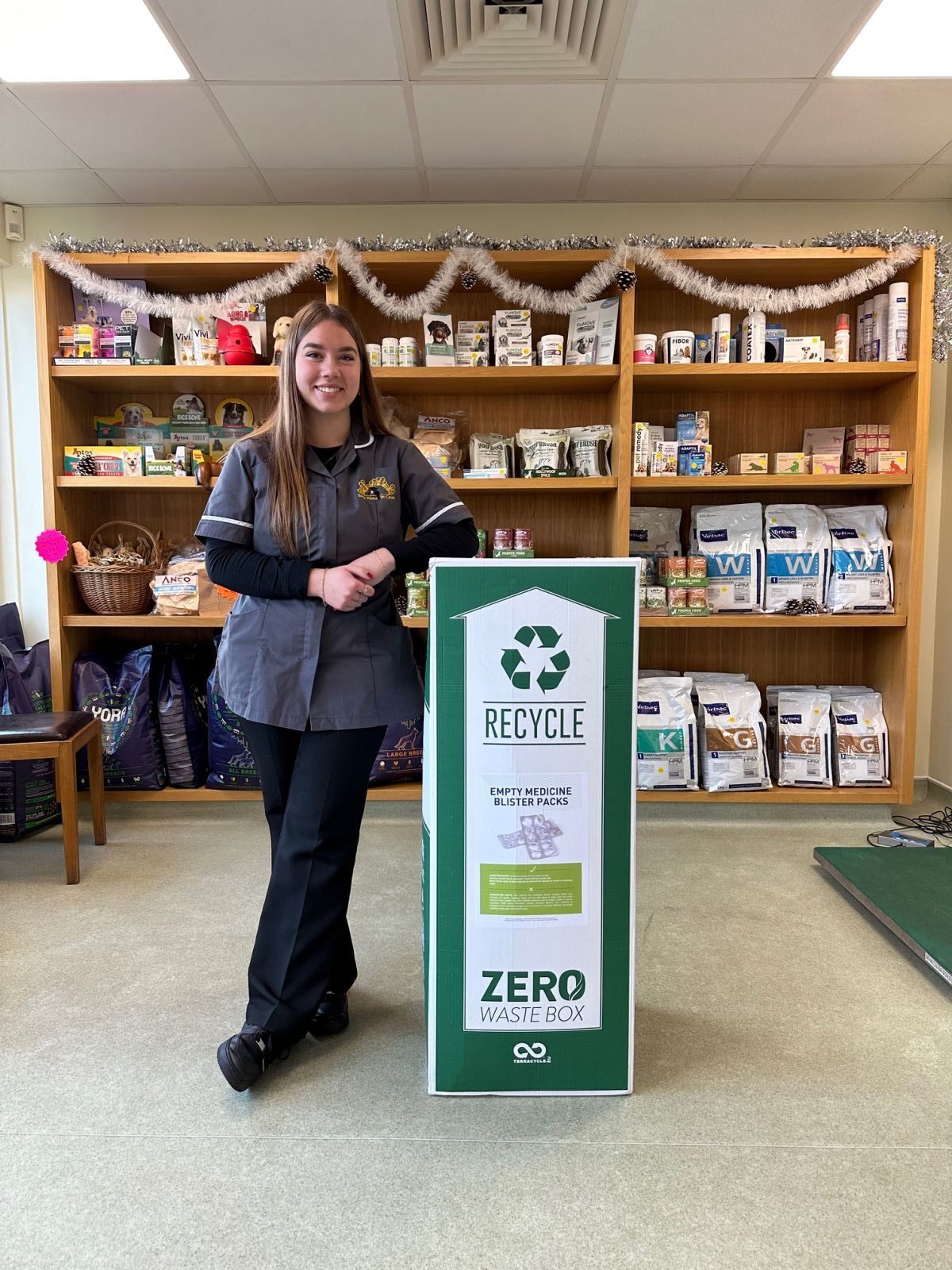Small World Vet Centre: A Sustainable Approach to Clinical Veterinary Practice
Small World Vet Centre in Liphook is an independent small animal practice, owned by principle vet Phill Elliott.
Phill Elliott
Small World Vet Centre in Liphook is an independent small animal practice, owned by principle vet Phill Elliott. Phill has a wealth of experience having an MSc in Wild Animal Health and having worked in mixed practice, as a locum and in conservation and zoological medicine.

Case Study Background: An independent practice, opened April 2015, in a long-vacant, dilapidated commercial property, with a clear 'mission' from the outset; to establish an excellent reputation for pet care and use this as a platform to make a positive environmental impact.
Environmental Action
Premises Refurbishment:
Energy efficiency was foremost in planning the renovation of the premises. Our premises are unsuitable for microgeneration therefore we:
- maximised insulation of the roof and external walls
- installed LED lighting throughout
- installed energy efficient AC/heating in the practice itself
- installed combi-boiler for hot water and heating for the living area upstairs with a plan to replace with air-source heat pump in the future
Our energy supplier is Ecotricity who provide 100% renewable electricity, 'green' gas, and use their profits to build more renewable generation capacity.
We have fitted house-martin nest 'boxes' where there was evidence of previous nests.
Practice Protocols:
We stock and proactively promote Yora pet food, the first insect protein based diet for pets. We have been encouraging its use since its launch in 2019 and we offer it at a price set to encourage conversion.
We actively drive down consumption/waste of resources and promote recycling. We inform suppliers of our 'preferred status' for those with a robust and genuine environmental policy.
We employ low-flow gaseous anaesthetic using capnograph to minimise iso/O2 use.
We provide a packet of native wild-flower seeds (with instructions) in every condolence card - each sufficient for 5m2 of bee-friendly border (10g). So far we have given out enough for an area of over 3000m2.
We make an ecologi-monthly 'climate contribution' to a combination of tree planting and gold-standard carbon reduction/avoidance projects. We are working towards ecologi zero and track our carbon emissions via accounting software. We are committed to achieving 'net zero' before 2030.
We have Links from our website allowing clients to see our impact.
We promote environmental citizen science projects, liaising with local conservation and higher education stakeholders.
We make donations to charities effectively tackling the climate/biodiversity crisis and have donated £12,000+ to date.
We stock a selection of retail items offering behavioural/health benefits for the pet rather than those marketed to appeal to their owner with an emphasis on longevity and sustainability.
We provide staff with incentives to choose an alternative to flying to their holiday destinations.
We proactively educate owners regarding correct and responsible disposal of faeces.
We did join an environmental accreditation scheme but found the process actually slowed progress as it consumed scarce staff time collating resource data (low motivation) rather than planning more ambitious projects (high motivation). We may however revisit this when we are fully staffed and have more resource.

Antimicrobial Use
Like many practices, we endeavour to promote responsible, evidence-based use of antimicrobials. Clients receiving these medications receive two messages (via PetsApp) following the dispensing of these drugs:
• The first after two days to check on compliance and offer assistance if the owner is struggling with administration.
• The second towards the end of the course to encourage completion and/or return of unused medication for safe disposal.
Information gained in this way is recorded to inform future prescribing e.g. the preferred form/flavour of medication, most successful method of administration, flagging up past poor compliance.
Culture and sensitivity testing is encouraged when appropriate. In general terms, adding a reasonable fixed charge to external lab fees (to cover processing, reporting and treatment planning), rather than a percentage mark-up, usually makes the cost of doing so more affordable.
Pharmaceutical Waste
We encourage the use of small volume injectable vials/ampoules to reduce discarding unused product.
We promote recycling of blister packs via Terracycle, with printed slips placed in every dispensing envelope reminding owners to return them to us (including any from their personal medication).

Parasiticide Protocol
We have always chosen to treat internal and external parasites separately to allow greater flexibility. Initially, we took a precautionary approach (monthly use of milbemycin) with respect to angiostrongylus having seen a handful of suspected and one confirmed case. Even prior to the recent published evidence of the environmental impact of ectoparasiticides in waste water, it was reasonable to assume that environmental contamination was likely and so we avoided topical imidocloprid products due to concerns over wash-off. As a semi-rural practice, there is a high risk of exposure to ticks, and so oral isoxazoline (Bravecto) was a logical choice, alongside clear advice to 'pick up' due to faecal excretion, and an option for not treating between November-February (careful weekly examination with flea comb instead). Cats are treated according to lifestyle with equivalent products.
We made it practice policy to stop the already low level of dispensing of topical preparations for dogs in 2019, with the exception of using Advocate (or equivalent) to treat suspected lung-worm cases when testing was declined. We had zero negative feed-back for making this change.
We continued with spot-on isoxazolines in cats as this is absorbed systemically rather than surface-acting, again with advice regarding disposal of faeces.
The Wellness Plans- 'Pet & Pocket'/'Pet & Planet'
We had no interest in having a 'traditional' health plan as we felt it was impossible to tailor parasite prevention to the risk profile of the individual animal; blanket treatment is inherent to the subscription. At the time, there was no affordable means to structure one otherwise, as this would involve regular testing to mitigate the risk of endoparasites to the pet (especially angiostrongylus) and to their owners (especially toxocara spp). The faecal testing methods available at the time were relatively time consuming and of low sensitivity due to intermittent shedding of ova.
In the meanwhile we implemented a practice policy to test all dogs presented for surgery or dentistry (Angio Detect, Idexx), which did not have a prior history of adequate protection. We found zero positives, suggesting low local risk of exposure despite being in a 'high-risk' area according to Bayer incidence map.
Game changers in the development of our plans were the arrival of:
1) Fecal Dx® Antigen (Idexx) - cost effective, sensitive faecal test for presence of a range of worms, not dependent on the presence of ova, and therefore allowing detection in pre patent period.
2) PetsApp - powerful tool for scheduling and automating essential messaging, explaining the premise of a very different kind of wellness plan based on testing rather than blanket treatment, and generating reminders for treatment/visits. This was key to informed consent.
We launched two plans in October 2023, both allowing tailoring of parasiticide use according to individual lifestyle, by offering a discount rather than inclusivity. We opted for the Elanco 'My Pet Persona' tool to formalise and standardise this assessment.
Both include the usual vaccinations, microchipping, claw-clipping, discounts on neutering, dentistry etc. Unusually, they include unlimited consultations, promoting earlier intervention when the pet is ill, and a discount on our chosen insect-protein based diet, Yora. Uniquely, the subscription includes an annual 'climate contribution' equivalent to the estimated carbon-paw-print of their pet (to be purchased via Ecologi for clear accountability).
However, our 'flagship' plan, Pet & Planet, enhances this with quarterly testing (Angio Detect in dogs and Fecal Dx® Antigen) as a means to assess the pet's actual risk of exposure, explore the prevalence of various parasites in our local area, and check for success of treatment. No formal monitoring for anthelmintic resistance is performed in the UK currently so this is of value in itself. The testing is designed to inform treatment, not replace it, but it is hoped that most dogs will be able to drop to quarterly worming rather than monthly, perhaps less frequently in some cases. A precautionary approach is adopted for puppies/kittens and where the owners' household includes anyone considered vulnerable (infants, immune-compromised etc). If a dog has been effectively wormed monthly prior to joining the plan, the initial tests will be a poor predictor of their risk of exposure, and so the testing interval may be reduced initially and/or monthly faecal smears examined for angiostrongylus larvae to monitor more closely.
The plan also includes annual blood and urine analysis, and also a Vaccicheck test to assess the need for DHP or FPLV vaccination, again enabling tailored protection and avoiding unnecessary use of vaccines.
We chose a 'soft' launch initially to allow time to optimise the automatic messaging via PetsApp, thereby reducing the burden on staff. Being very different to the type of plan clients are used to, having good quality printed and online information is essential. It also provides an opportunity to educate on the reasons for the different approach.
Also, as a novel 'product', there is no direct point of comparison with which to establish a price point, and so advice was sought from a consultant with experience in health plans offering unlimited consultations. Removing the financial obstacle to clients wishing to consult a vet or nurse for any reason is clearly a valuable benefit and always attracts interest. However, some clients, especially those accustomed to traditional health plans, appear to only seek the 'tangible' benefit of inclusive parasite treatment. Perhaps predictably when breaking new ground, uptake has been slow but steady, but is expected to increase as we start to push the plans more actively through various channels.
As with all health plans, the practice should benefit from reliable and regular income, with higher adoption of diagnostic procedures balancing the lower margin. However, our plans also serve as a clear demonstration of our practice ethos and will hopefully help move mainstream discussion of preventative healthcare in a more sustainable direction. Currently, there is a ratio of 1 pet on Planet for every 5 on Pocket, which is again expected given the price differential. However, offering this level of testing and health surveillance to a client outwith a health plan, at full cost, would meet with very little interest and so every sign-up to Planet is a gain for their pet and the environment.
One notable outcome at other practices that have offered unlimited consultations over a longer period is the reduction in acute admissions of pets in crisis for fluids and emergency work-up, presumably because these potential cases are presented much earlier. While this is great for the pet and owner, it also represents a reduction in the use of disposable consumables involved in critical care.
